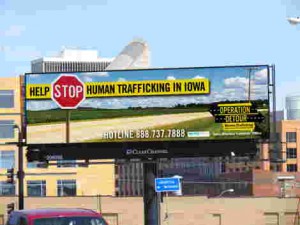Iowa Law Enforcement, Community Advocates and CCO Combat Human Trafficking
Gail Chiasson, North American Editor
Clear Channel Outdoor Holdings Inc., together with local, state and federal law enforcement in central Iowa, have launched an out-of-home media campaign to combat human trafficking in the Des Moines region.
 For the next four weeks, 30 Clear Channel Outdoor Americas digital billboards across Polk County are displaying educational messages about human trafficking that alert victims how to ‘get help to get out’ of the life, and enlist the help of citizens in the ongoing fight to end this crime.
For the next four weeks, 30 Clear Channel Outdoor Americas digital billboards across Polk County are displaying educational messages about human trafficking that alert victims how to ‘get help to get out’ of the life, and enlist the help of citizens in the ongoing fight to end this crime.
Human trafficking is a form of slavery involving the illegal trade of people for exploitation or commercial gain. Traffickers use force, fraud, or coercion to lure their victims, and force them into labor or commercial sexual exploitation. Victims rarely come forward because they fear their traffickers and may also fear law enforcement, and many victims do not come forward due to language barriers.
In 2014, the National Human Trafficking Resource Center hotline fielded 24 reports of human trafficking in Iowa, with more than half involving minors. Since 2007, the hotline has received reports of nearly 100 incidents.
The International Labor Organization estimates that there are 21 million people worldwide who are victims of forced labor. Of those, ILO estimates that 4.5 million are victims of forced sexual exploitation.
“We want to hold human traffickers accountable in Iowa, and we hope this collaborative public awareness effort will help us rescue victims and pursue traffickers on our streets and highways,” Attorney General Tom Miller said. “Human traffickers try to keep a low profile. The more eyes we have to help us identify traffickers and their victims, the better off we are.”
The outdoor media campaign is a joint effort involving CCOA-Des Moines, the Office of the Attorney General of Iowa, the United States Attorney’s Office-Southern District of Iowa, Des Moines Police Department, Polk County Sheriff’s Office, Iowa State Patrol, and the FBI.
The digital billboard messages inform trafficking victims who may be unaware that resources exist to help them, and urge the public to help identify and report suspicious activity. The ads direct passersby to the NHTRC’s 24-hour, multi-lingual and confidential hotline for victims and community members.
“Human trafficking is found in our own communities regardless of socio-economic status,” said Terry Hernandez, executive director, Chrysalis Foundation, a public foundation supporting girls and women in the greater Des Moines. “In Iowa, we find foster care children and runways are particularly vulnerable to the commercial sex industry. For Chrysalis, our concern is for girls in our after-school programs across the metro area. Our goal is to collaborate with local, state and federal law enforcement agencies to prevent victimization, and recover and provide a path for healing for victims of human trafficking”
Kellie Markey, founder of a safe house in Des Moines for victims of abuse and sex trafficking, said, “Children are bought and sold for sex every day in this country. While we are likely to never completely eliminate demand, it is up to community members to make the risks of this trade too great and to ensure the safety and recovery of the survivors of this terrible crime against humanity.”
CCOA launched its first anti-human trafficking campaign in Philadelphia in 2012 and has since supported campaigns in cities and states across the US. This is CCOA’s 17th anti-human trafficking campaign. The data show these campaigns drive calls to the hotline, including tips and requests by victims for help.

Follow DailyDOOH